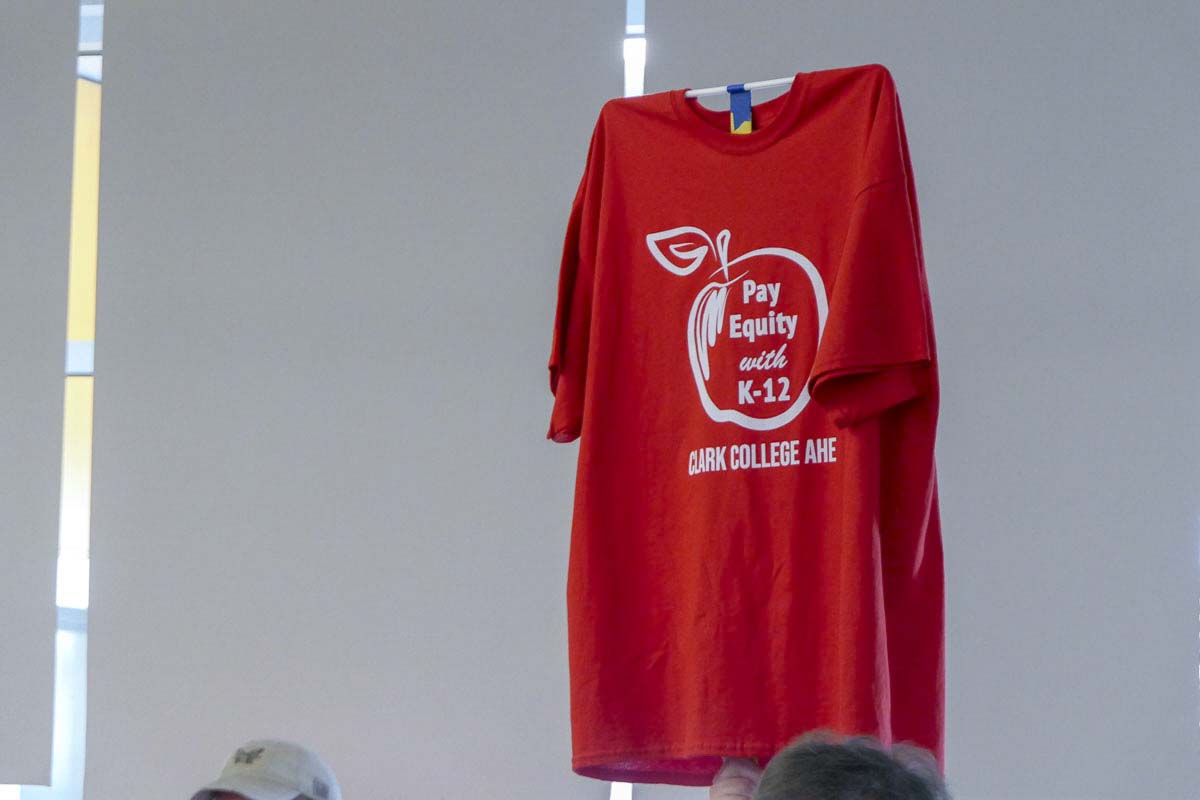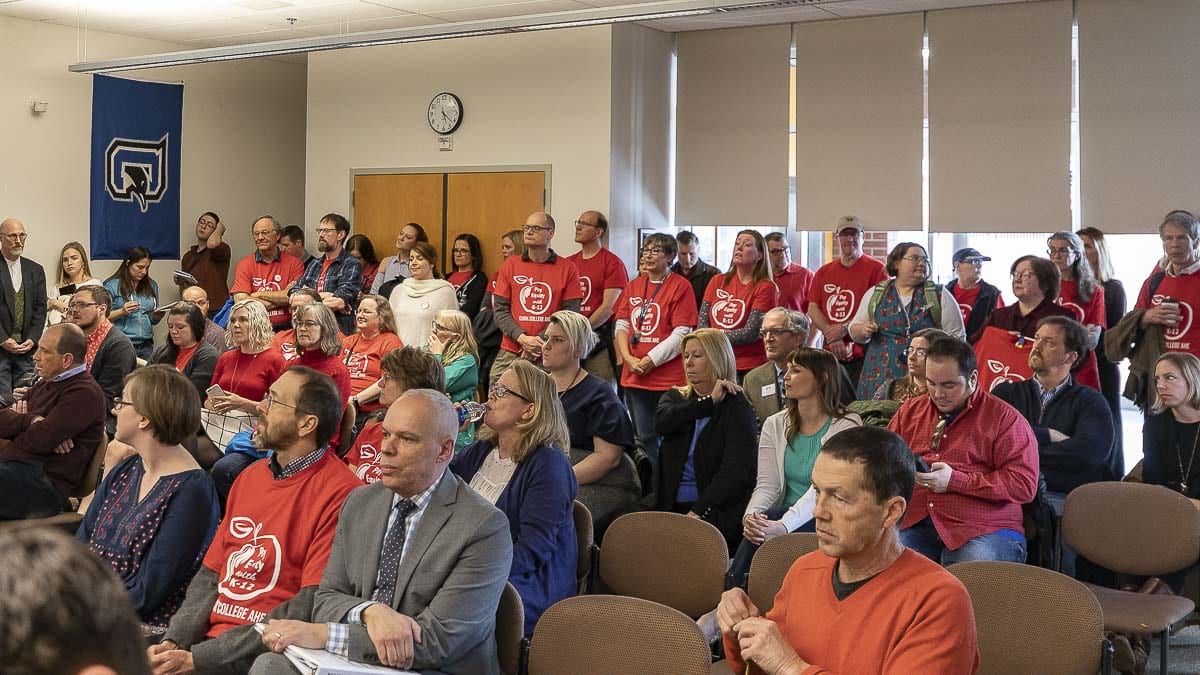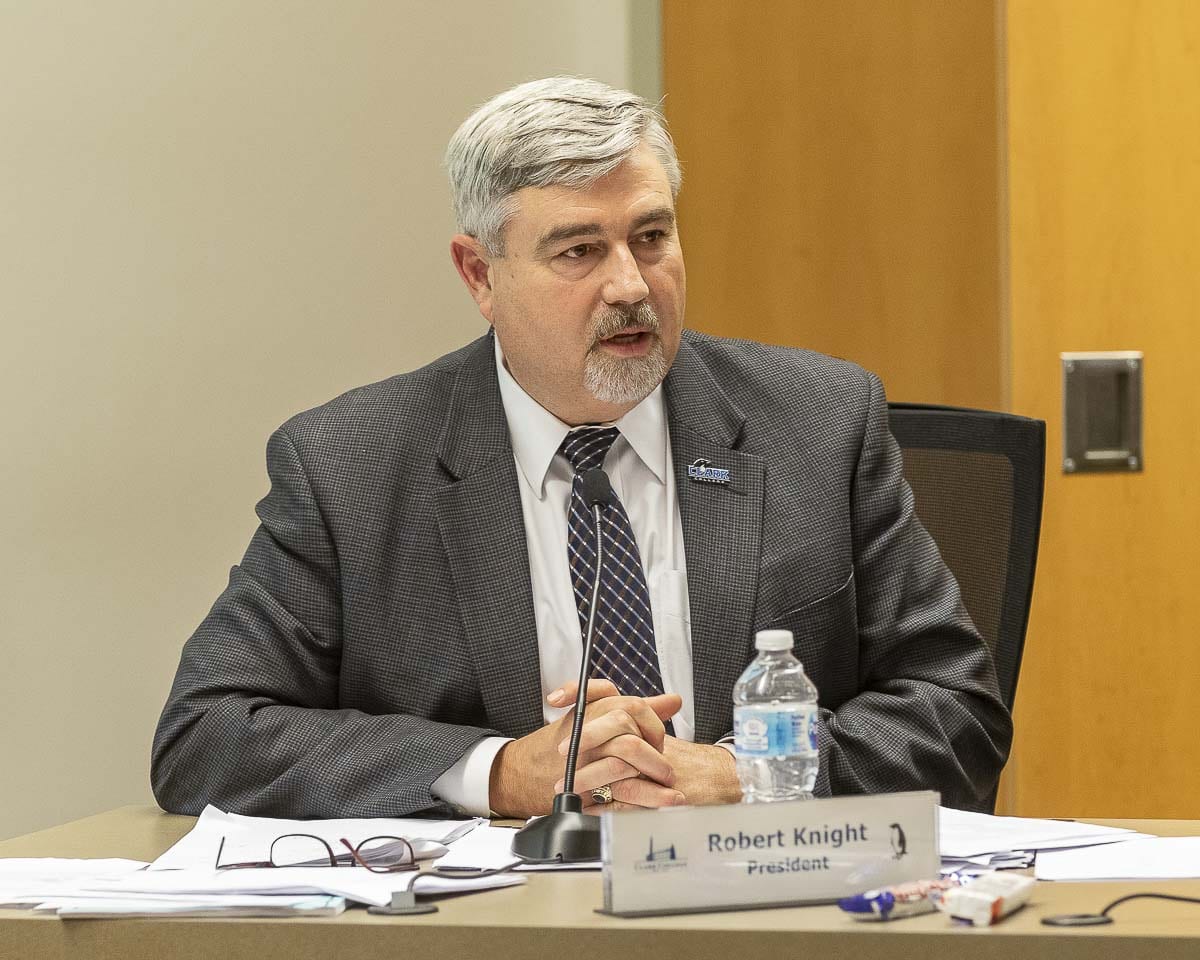Faculty members packed another Board of Trustees meeting to push for raises the school says it can’t afford
VANCOUVER — Emotions were near the surface again at this month’s Clark College Board of Trustees meeting, as the community college and certificated faculty remain at loggerheads when it comes to pay.

Faculty members packed the meeting at Gaiser Hall, wearing red shirts reading “Pay equity with K-12,” and applauding as several Association for Higher Education (AHE) members took turns grilling Clark College President Bob Knight and the board.
“I just think that the priorities of this process are a little out of whack,” said Kathrena Halsinger, an art teacher and member of the AHE bargaining team. “Administration has grown 81 percent in the last 10 years, 41 percent after we took the budget cuts in 2016.”
Knight, who is retiring later this year, said he finds the union tactics and comments “disheartening” and, in many cases, out of context. “We were significantly low, and a lot of that happened because we moved classified employees into administrative positions.”

While it is true that administrative positions have grown 81 percent over the past 10 years, Knight says they are still under staffed compared to other colleges in Washington state. He cites statistics that Clark College has one administrator for every 85 students, well below the 54.5 students-per-administrator average at other state colleges.
“I try not to take it personal, but it’s just disheartening to see the tone and tenor of what’s happening here,” Knight told the few faculty members who remained toward the end of the Wednesday board meeting.
“It’s unfortunate that faculty are choosing to come at it sort of this way,” Knight added, “because we need to go united, not for just faculty salary but for all salaries.”
Board Chair Royce Pollard sided with Knight, saying faculty members need to come with them to Olympia to put pressure on lawmakers to address their budget situation.
“The state has said ‘you negotiate,’ but they didn’t give us any money to negotiate with,” Pollard said. “We need to go to them, and therefore that puts us in a real bind.”
Knight has called for 5 percent cuts to the school’s budget, blamed on sagging enrollment numbers, which is largely what state funding is based on. Revenue from the Running Start program, he says, can no longer offset losses in other areas without an influx of state investment.
Blame Olympia
Knight put the blame for the current dispute largely on the legislature.
First, the McCleary-mandated funding fix poured billions of dollars more into basic education, providing massive pay increases for many K-12 educators across the state. While saying he agrees that they deserved the money, Knight also admits it created a larger pay gap between grade school educators and those at Clark College.
A top-earning teacher at Evergreen school district can earn over $91,000 per year. By comparison, non-tenured faculty positions at Clark College start at $53,281 and top out just above $76,000. Tenured professors can earn up to $79,185.
According to the union, the K-12 raises over the Summer mean their members are now earning, on average, 25 percent less than their colleagues in basic education.
AHE President Kimberly Sullivan told the board the union recently conducted a psychological health survey of their members.
“I was shocked at what it showed,” Sullivan said.

Their survey, which 65 percent of faculty members responded to, showed 43 percent work a second job outside of Clark College. 81 percent said they experienced anxiety or depression related to work, and 22 percent said they drank or used drugs in response to conditions at work.
“When I have talked to people they said ‘I thought I was the only one. I thought I was the only one.’ And it goes just like that around the room,” said Sullivan, “and we’re starting to realize there isn’t just one of us. There’s a huge population of us.
“We matter,” she continued after asking faculty in the room to stand up. “The people in this room matter. And the work we’re doing, the pay we get, is demoralizing us. It is making us sick.”
Sullivan also blasted Knight for a comment made behind closed doors prior to the meeting. While discussing the budget, she claimed Knight said he “couldn’t do that” to the school’s next president.
“Now I’m not sure exactly what the ‘that’ is to the next president,” Sullivan said, “but I am sure of this: considering the budget impact on a nameless, faceless administrator that we will not work with for two years is hurtful beyond words.”
At the February board meeting, Knight said he had offered faculty a 1 percent raise, which would be in addition to an anticipated 6 percent raise for all college employees over the next two years. Suzanne Southerland, a tenured professor of communications at the school, called that offer “a slap in the face.”

“We made the offer of 1 percent additional to faculty — not to classifieds, not to administrators — but to faculty as just a good faith gesture,” Knight responded, “and that’s taking a cut to make that happen.
“If 1 percent is disrespectful,” he added, “then 0 percent is even worse.”
Knight also blames the legislature for passing a bill last year that allowed the college to negotiate its own salary increases with employees. Previously, those negotiations happened at the state level.
“Up until last year, we couldn’t even negotiate salary. It wasn’t allowed,” he said. “They gave us that opportunity without funding. It was an unfunded mandate.”
All the more reason, according to Knight, that the two sides need to come together and take a drive north to Olympia before the current legislature wraps up business at the end of April.
“The people who need to hear your frustration are in Olympia,” said Pollard. “So we need to go together to talk to them about that.”
But from the tone of Sullivan and the others who spoke out about their own struggles to pay bills and earn a living wage while working full time at the college, it seems as if the rift is only growing deeper.
“If the college is broke, we didn’t break it. So who is responsible?” asked Sullivan. “We could ask ‘who didn’t do their job?’ I’d rather ask ‘who thinks that we should bear the cost and be punished for it?'”
While the union has not officially said whether they might go on strike, a clock at the top of their website is counting down with just about a week to go at the time of this article being published.




